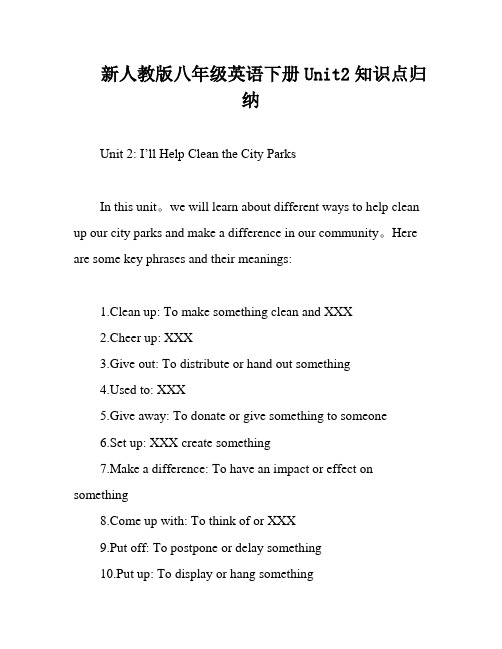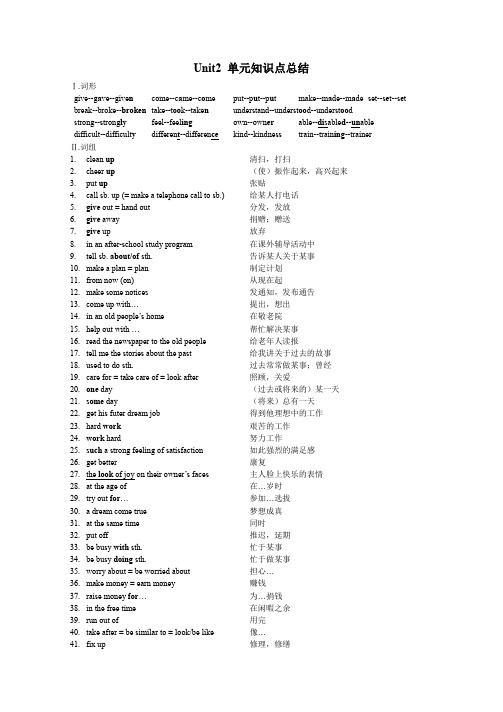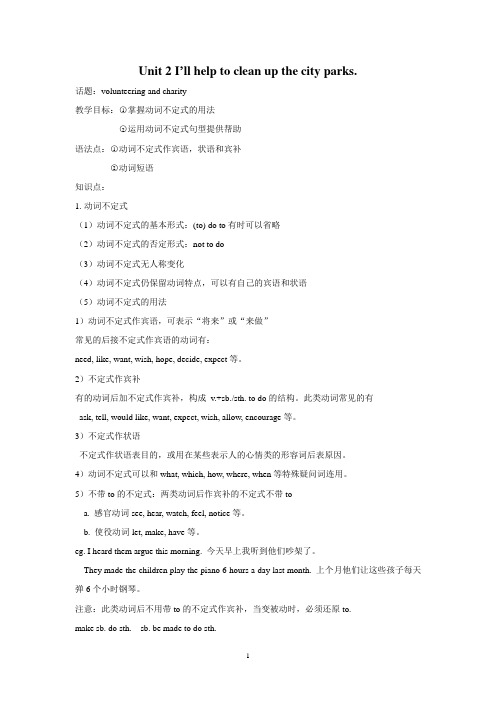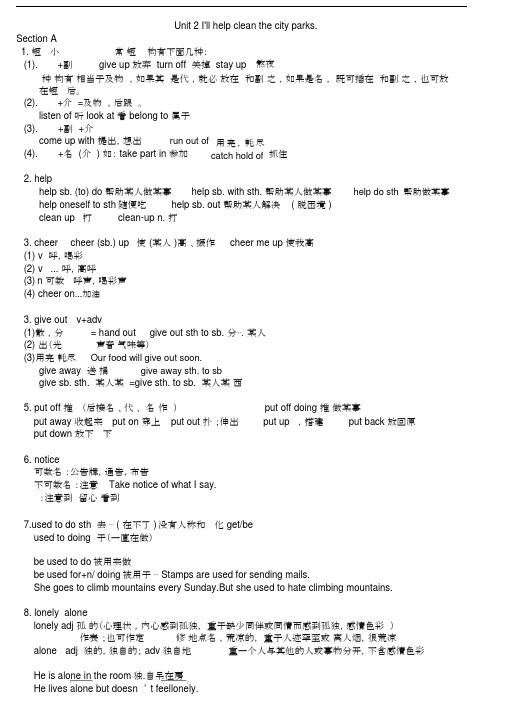(完整版)新版新目标英语八年级下册unit2知识点总结
(完整版)人教版新目标八年级下册英语Unit2知识点.doc

八年级下册Unit2 I ’ll help to clean up the city parks知识点Section A1. help v./n. 帮助→ helpful adj. 有帮助的1). help sb. to do sth.帮助某人做某事;2). help (sb.) with sth.在某方面帮助某人;3). help oneself (to) 自用(食物等); 4). help sb. out 帮助某人克服困难,渡过难关、解决问题、完成工作;5). with the help of在帮助下;2. clean up 打扫 (或清除 )干净3. hope n./v. 希望;期望hope to do sth. 希望做某事I hope so. 希望如此。
I hope not. 但愿不会4.cheer up 使振奋,使高兴的(v. +adv)cheer sb. up =make sb. happy 使某人高兴5. give out =hand out 分发【 give 短语】: give back=return归还give sb. a call 给打电话give away 赠送give sb. a hand =help sb. 帮助某人give up (doing sth.)放弃(做某事)give sb. sth = give sth to sb. 给某人某物6. volunteer v. 志愿n. 志愿者volunteer to do sth.自愿做某事7. come up with =think up想出catch up with赶上,追上end up with 结束;以结束keep up with跟上;跟、保持联系8. Clean-up Day 清洁日9. use v.使用→ useful adj. 有用的use sth. to do sth. 用某物做某事be /get used to doing sth 习惯于做某事used to do sth 过去常常做某事,表示过去做过的事现在已经不做,只用于过去时态。
人教新目标版八年级下册Unit2 I'll help to clean up the city parks单元知识点

Unit 2 I’ll help to clean up the city parks.课时 1 Section A(1a-2d)学习目标:一、掌握动词短语clean up, cheer up 的用法。
(重点)二、能用could, can’t, will等情态动词给出建议。
课堂导学:1.You could help to clean up the city parks.Clean up 为动副短语,意为“打扫干净”。
若后接代词作宾语,代词应放在clean和up中间;若后接名词作宾语,名词可放在两次之间或up之后。
She cleaned up the broken glass on the floor.即学即练一根据汉语意思完成句子我的房间很脏,所以我必须把它打扫干净。
My room is very dirty, so I have to .2.The girl could visit the sick kids in the hospital to cheer them up.短语2:cheer up使高兴;使振奋。
后接代词作宾语时,代词应放在cheer up中间.She failed the exam, and we want to cheer her up.即学即练二单项选择The child looked sad. Let’s .(选出与划线部分意思相同或相近的选项)A. happyB. make him happyC. shoutD. give help3.The boy could give out food at the food bank.短语3:give out 分发;散发;发放give out 是动副短语,意为“分发;散发;发放”,后接名词作宾语时,名词可放在短语后面,也可放在短语中间;后接代词作宾语时,代词只能放在短语中间。
其同义短语为“hand out”。
I saw a man giving out leaflets in the street.Give them out before class begins.即学即练三单项选择-Would you like to help me to the papers to the students, Tom?-Certainly, Miss Wang.A.give upB. give offC. give outD. give in4. We could put up signs.短语4:put up张贴;搭建Put up在该句中意为“张贴(布告)等”,此外它还可表示“公布;搭建;举起(手)等”。
新人教版八年级英语下册Unit2知识点归纳

新人教版八年级英语下册Unit2知识点归纳Unit 2: I’ll Help Clean the City ParksIn this unit。
we will learn about different ways to help clean up our city parks and make a difference in our community。
Here are some key phrases and their meanings:1.Clean up: To make something clean and XXX2.Cheer up: XXX3.Give out: To distribute or hand out somethinged to: XXX5.Give away: To donate or give something to someone6.Set up: XXX create something7.Make a difference: To have an impact or effect on somethinge up with: To think of or XXX9.Put off: To postpone or delay something10.Put up: To display or hang somethingHere are some usage notes to keep in XXX:1.Need to do something: To require or be necessary to do something2.Make plans to do something: To create a plan or strategy for doing something3.Ask someone (not) to do something: To request or demand that someone (not) do somethinged to do something: To refer to a past XXX5.Decide to do something: To make a XXX do something6.Help someone (to) do something: To assist or aid someone in doing something7.Make a difference to: To have an impact or effect on something8.Make it possible for someone to do something: To enable or XXX do somethingNow。
新目标英语八年级下Unit2-知识点总结

Unit2 单元知识点总结Ⅰ.词形give--g a ve--give n come--c a me--c o me put--p u t--p u t make--m a de--m a de set--s e t--s e t break--broke--broken take--t oo k--take n understand--underst oo d--underst oo dstrong--strong ly feel--feel ing own--own er able--dis able d--un abledifficult--difficult y differen t--differen ce kind--kindness train--train ing--trainerⅡ.词组1.clean up清扫,打扫2.cheer up(使)振作起来,高兴起来3.put up张贴4.call sb. up (= make a telephone call to sb.) 给某人打电话5.give out = hand out 分发,发放6.give away 捐赠;赠送7.give up 放弃8.in an after-school study program 在课外辅导活动中9.tell sb. about/of sth. 告诉某人关于某事10.make a plan = plan 制定计划11.from now (on) 从现在起12.make some notice s发通知,发布通告e up with…提出,想出14.in an old people’s home 在敬老院15.help out with …帮忙解决某事16.read the newspaper to the old people 给老年人读报17.tell me the stories about the past 给我讲关于过去的故事ed to do sth. 过去常常做某事;曾经19.care for = take care of = look after 照顾,关爱20.one day (过去或将来的)某一天21.some day (将来)总有一天22.get his futer dream job 得到他理想中的工作23.hard work艰苦的工作24.work hard 努力工作25.such a strong feeling of satisfaction 如此强烈的满足感26.get better 康复27.the look of joy on their owner’s faces 主人脸上快乐的表情28.at the age of 在…岁时29.try out for…参加…选拔30. a dream come true 梦想成真31.at the same time 同时32.put off 推迟,延期33.be busy with sth. 忙于某事34.be busy doing sth. 忙于做某事35.worry about = be worried about 担心…36.make money = earn money 赚钱37.raise money for…为…捐钱38.in the free time 在闲暇之余39.run out of 用完40.take after = be similar to = look/be like 像…41.fix up 修理,修缮42.not … any more = no more 不再43.write to sb. 给某人写信44.feel/be lonely感到孤独45. a lonely village 一个偏僻的小乡村46.travel alone (= by oneself = on one’s own) 独自旅行47.set up 建立,创立48.make it adj. for sb. to do sth. 使某人做某事…49.dis able d people 残疾人50.make a big difference to…对…有很大影响51.make no difference to…对…没有影响52.answer the telephone 接电话53. a friend of mine = one of my friends 我的一个朋友(双重所有格)54.be excited about…对…感到兴奋55.at once = right away 立刻,马上56.send sb. sth = send sth. to sb. 寄(送)给某人某物57.Best wishes 衷心的祝福58.be strong in = do well in = be good at 擅长做某事59.work out fine 产生好的结果;成功60.in need 有需要地61.decide to do 决定做某事62.volunteer to do 义务做某事Ⅲ.语法ⅰ.动词不定式:①v.+ to do(作宾语)②v.+ sb.+ to do(作宾补)③…to do(表目的、结果)④It be adj.for/of sb. to do sth. (真正的主语)⑤make/think/find it adj. to do (真正的宾语)⑥what/how to do.(复合不定式)ⅱ.动词短语:①v.+ adv.(后跟名词、代词、动名词。
新目标英语八年级下第2单元知识点

Unit 2 I’ll help to clean up the city parks.话题:volunteering and charity教学目标:○1掌握动词不定式的用法○2运用动词不定式句型提供帮助语法点:○1动词不定式作宾语,状语和宾补○2动词短语知识点:1.动词不定式(1)动词不定式的基本形式:(to) do to有时可以省略(2)动词不定式的否定形式:not to do(3)动词不定式无人称变化(4)动词不定式仍保留动词特点,可以有自己的宾语和状语(5)动词不定式的用法1)动词不定式作宾语,可表示“将来”或“来做”常见的后接不定式作宾语的动词有:need, like, want, wish, hope, decide, expect等。
2)不定式作宾补有的动词后加不定式作宾补,构成v.+sb./sth. to do的结构。
此类动词常见的有ask, tell, would like, want, expect, wish, allow, encourage等。
3)不定式作状语不定式作状语表目的,或用在某些表示人的心情类的形容词后表原因。
4)动词不定式可以和what, which, how, where, when等特殊疑问词连用。
5)不带to的不定式:两类动词后作宾补的不定式不带toa. 感官动词see, hear, watch, feel, notice等。
b. 使役动词let, make, have等。
eg. I heard them argue this morning. 今天早上我听到他们吵架了。
They made the children play the piano 6 hours a day last month. 上个月他们让这些孩子每天弹6个小时钢琴。
注意:此类动词后不用带to的不定式作宾补,当变被动时,必须还原to.make sb. do sth. sb. be made to do sth.2.短语动词短语动词时一种固定词组,由动词加介词或副词等构成,其作用相当于一个动词。
(完整版)新版新目标英语八年级下册unit2知识点总结.doc

Unit 2 I'll help clean the city parks.Section A1. 短小常短构有下面几种:(1).+副give up 放弃 turn off 关掉 stay up 熬夜种构有相当于及物,如果其是代,就必放在和副之,如果是名,既可插在和副之,也可放在短后。
(2).+介 =及物,后跟。
listen of 听 look at 看 belong to 属于(3).+副 +介come up with 提出,想出run out of (4).+名 (介 ) 如: take part in 参加用完,耗尽catch hold of 抓住2. helphelp sb. (to) do 帮助某人做某事help sb. with sth. 帮助某人做某事help oneself to sth随便吃help sb. out 帮助某人解决 (脱困境 )clean up打clean-up n. 打help do sth 帮助做某事3. cheer cheer (sb.) up使(某人)高、振作cheer me up 使我高(1)v 呼,喝彩(2)v ...呼,高呼(3)n 可数呼声,喝彩声(4)cheer on...加油3. give out v+adv(1)散,分= hand out give out sth to sb. 分⋯. 某人(2)出(光声音气味等)(3)用完耗尽Our food will give out soon.give away 送捐give away sth. to sbgive sb. sth. 某人某 =give sth. to sb. 某人某西5. put off 推(后接名、代、名作)put away 收起来put on 穿上put out 扑;伸出put down 放下下put off doing 推做某事put up ,搭建put back 放回原6.notice可数名:公告牌,通告,布告不可数名:注意 Take notice of what I say.:注意到留心看到ed to do sth 去⋯ (在不了 )没有人称和化get/beused to doing于(一直在做)be used to do被用来做be used for+n/ doing被用于⋯ Stamps are used for sending mails.She goes to climb mountains every Sunday.But she used to hate climbing mountains.8.lonely alonelonely adj 孤的(心理状,内心感到孤独,重于缺少同伴或同情而感到孤独,感情色彩)作表;也可作定修地点名,荒凉的,重于人迹罕至或离人烟,很荒凉alone adj 独的,独自的; adv 独自地重一个人与其他的人或事物分开,不含感情色彩He is alone in the room独.自呆在房He lives alone but doesn ’ t feellonely.9. volunteer(1)可数名词志愿者(2)adj. 自愿的(3) v volunteer to do sth 志愿效劳、主动贡献They are the Chinese People olunteers’V. 他们是中国人民志愿军。
新目标英语八年级下unit2知识点总结

14. alone=by oneself 孤独的,独自的(强调一人)只能作表语状语 lonely 孤独的,寂寞的(由于周围环境的荒凉而内心孤独寂寞)既作表语又作定语
你帮助拥有幸运儿对我来说成为可能。
21.Lucky makes a big difference to my life. 幸运儿对我的生活起重要作用
22.I love animals and I was excited about the idea of having a dog.
14.She could read by herself at the age of four.=when she was four years old.当她四岁时就独自会看书了。
15.she decided to try out for a volunteer after-school reading program.她决定参加课后阅读计划自愿者竞赛。
17. used to do sth 过去常常干某事
18. give up doing sth =stop doing sth放弃干某事;give it/them up
19. such a strong feeling=so strong a feeling这么一种强烈的感情 such a / an +形容词+单数名词=so+形容词 +a /an + 单数名词
我干我热爱干的工作同时帮助别人。
19.we can make plans to visit sick children or raise money for homeless people.
英语八下第二单元笔记

英语八下第二单元笔记The second unit of English class in eighth grade covers various topics such as wildlife conservation, environmental protection, and the importance of biodiversity. 这门英语课八年级第二单元涵盖了各种主题,如野生动物保护、环境保护以及生物多样性的重要性。
One of the key lessons in this unit is the impact of human activities on the environment, specifically how deforestation, pollution, and habitat destruction affect ecosystems and wildlife. 这个单元的一个关键教训是人类活动对环境的影响,特别是森林砍伐、污染和栖息地破坏对生态系统和野生动物的影响。
Through studying this unit, students can gain a better understanding of the interconnectedness of all living things and the importance of preserving natural habitats for future generations. 通过学习这个单元,学生们可以更好地理解所有生物之间的相互联系,以及为了子孙后代保存自然栖息地的重要性。
Moreover, students will also learn about the role of national parks and wildlife reserves in protecting endangered species andpromoting biodiversity. 此外,学生们还将了解国家公园和野生动物保护区在保护濒危物种和促进生物多样性方面的作用。
- 1、下载文档前请自行甄别文档内容的完整性,平台不提供额外的编辑、内容补充、找答案等附加服务。
- 2、"仅部分预览"的文档,不可在线预览部分如存在完整性等问题,可反馈申请退款(可完整预览的文档不适用该条件!)。
- 3、如文档侵犯您的权益,请联系客服反馈,我们会尽快为您处理(人工客服工作时间:9:00-18:30)。
Unit 2 I'll help clean the city parks.Section A1. 短语动词小结常见短语动词结构有下面几种:(1).动词+副词give up 放弃turn off 关掉stay up 熬夜这种结构有时相当于及物动词,如果其宾语是代词,就必须放在动词和副词之间,如果是名词,则既可插在动词和副词之间,也可放在短语动词后。
(2).动词+介词=及物动词,后跟宾语。
listen of 听look at 看belong to 属于(3).动词+副词+介词come up with 提出,想出run out of 用完,耗尽(4).动词+名词(介词) 如:take part in参加catch hold of 抓住2.helphelp sb. (to) do 帮助某人做某事help sb. with sth. 帮助某人做某事help do sth 帮助做某事help oneself to sth随便吃help sb. out 帮助某人解决难题(摆脱困境)clean up 打扫clean-up n. 打扫3. cheer cheer (sb.) up 使(某人)高兴、振作cheer me up 使我高兴(1) v 欢呼,喝彩(2) v 为...欢呼,高呼(3) n 可数欢呼声,喝彩声(4) cheer on 为...加油3.give out v+adv(1)散发,分发= hand out give out sth to sb. 分….给某人(2)发出(光热声音气味等)(3)用完耗尽Our food will give out soon.give away 赠送捐赠give away sth. to sbgive sb. sth. 给某人某东=give sth. to sb. 给某人某东西5. put off 推迟(后接名词、代词、动名词作宾语)put off doing 推迟做某事put away 收起来put on穿上put out扑灭;伸出put up张贴,搭建put back放回原处put down 放下记下6.notice可数名词:公告牌,通告,布告不可数名词:注意Take notice of what I say.动词:注意到留心看到ed to do sth过去…(现在不了) 没有人称和时态变化get/be used to doing习惯于(一直在做)be used to do被用来做be used for+n/ doing被用于…Stamps are used for sending mails.She goes to climb mountains every Sunday.But she used to hate climbing mountains.8.lonely alonelonely adj 孤单的(心理状态,内心感到孤独,侧重于缺少同伴或同情而感到孤独,感情色彩较强)作表语;也可作定语修饰地点名词,荒凉的,侧重于人迹罕至或远离人烟,很荒凉alone adj 单独的,独自的;adv 独自地侧重一个人与其他的人或事物分开,不含感情色彩He feels lonely without friends.He is alone in the room.独自呆在房间He lives alone but doesn’t feel lonely.9.volunteer(1)可数名词志愿者(2)adj. 自愿的(3) v volunteer to do sth 志愿效劳、主动贡献They are the Chinese People’s V olunteers. 他们是中国人民志愿军。
I volunteer to help you. 我自愿帮助你。
10.give up doing 放弃做某事give up time to do sth 放弃时间去做某事11.satisfaction n 满意satisfy v 使满意satisfied adj 满意的(1)be satisfied to do sth 对做某事感到满意(2)be satisfied with 对...感到满意(3)dissatisfaction dissatisfy dissatisfied12.sick adj. 生病的;恶心的,呕吐的作表语、定语ill adj. 生病的作表语,不能作定语13.raise(1)举起,抬起raise your hands(2)种植raise corn(3)饲养,供养raise a dog(4)筹集,征集raise money14.own(1)adj 自己的I have my own room. I saw it with my own eyes. 我亲眼看见它的。
(2)v 拥有=have I own a big room.(3)n owner 主人,可数He is the owner of the bike.(4) of one’s own. 属于某人自己的Section B1.run out run out of(1) run out (become used up). 用完,用尽主语往往为物(时间,食物,金钱,油等),本身就含有被动意义。
His money soon ran out. 他的钱很快就花光了。
Our time is running out. 我们剩下的时间不多了。
(2)run out of 用完了主语为人或某种能消耗物品的机器等,表示主动含义。
He is always running out of money before pay day. 他总是在发工资的日子还没有到就把钱花完了。
(3) 两者在一定条件下可以互换The petrol is running out. 汽油快用完了= We are running out of petrol. 我们快把汽油用完了。
Our time is running out. 我们剩下的时间不多了。
= We are running out of time(4) run out of 从.....跑出来(5) sth runs out 某物用尽了,用完了2.take after (在外貌、性格等方面)与(父母等)相像be similar to 与..相像/相似look after 照顾take care of 照顾look like 看上去像多指外貌be like 像指外貌性格3.write the letter to sb=write to sb 给某人写信receive a letter from sb=hear from sb 收到某人的来信4.disabled adj. 肢体有残疾的丧失能力的disable v. 使失去能力,使残疾5. make a difference to 对...产生影响big greatIt makes no difference to me.这对我没什么影响。
make no difference to 对...没有影响One false step will make a great difference. 失之毫厘谬以千里6.have difficulty in doing sth 在做某事方面有困难7.open(1)adj 开着的(closed);开张的,营业的;开放的(be open to )(2)v 打开将原来关着或合着的东西打开close8. train n. 火车v. 训练training n 训练;培养;锻炼train sb/sth. to do. 训练某人做某事We can train the dog to do farm work.train sb in sth在某方面训练某人He trains his daughter in medicine.She trains her dog to fetch things. 她训练她的狗去取东西。
9.be excited about 对....感到兴奋,激动be excited to do sth 对做某事感到兴奋10. thank you for doing 谢谢做某事11.be strong in 强项是strong adj 强壮的,强健的;坚固的,结实的;强烈的,厉害的12. work out v. + adv(1)结局,结果为The strategies that he came up with worked out fine. 他提出的这个策略效果很好。
(2)算出I have worked out our total expenses. 我已经算出了我们总的费用。
(3)制订出He worked out a plan. 他制订了一个计划。
(4)消耗完(精力等)He never seems to be worked out. 他好像永远不会疲乏似的。
(5)(使问题)逐渐解决e up with 提出想出=think up 想出catch up with 赶上追上put up 张贴call up 打电话write down 写下记下set up 成立建立put …to use 把… 投入使用,利用plan to do 计划做某=plan + 从句make plans to do sth 制定计划做某事ask sb to do sth 要求某人做某事get a feeling of 有...的感觉make it possible for sb to do sth 使得做某事对某人来说是可能的care for照顾come true实现fix up修理be similar with相似try out for参加选拔decide to do决定做…。
